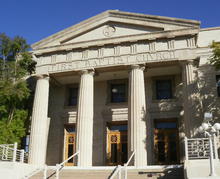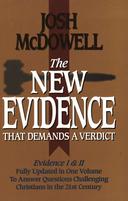
Why I Am a Christian
Why I Became A Christian
The one reason I became a Christian is because I was taught to be one. Between being raised by Christian parents and being exposed to evangelical (Southern Baptist) sermons and Sunday School teachings, at an early age (6 or 7 years old) I understood the essential propositions of Christianity:
|
Upon affirming the truth of these propositions, I undertook (with coaching) the prescribed follow-up: "The Sinner's Prayer" (it's the thoughts and intent, not the words, that count):
"Dear Jesus, I confess that you are God, and I have sinned against you. Thank you for dying for my sins and allowing me to be with you in Heaven. Please come into my heart (*) and be with me forever. Amen. * The "come into my heart" bit is (as far as I can tell) an unbiblical notion that has crept into the formula in the last century. It is mostly innocuous, but is occasionally the subject of debate. |
At this point, by confessing my guilt before God and receiving the free gift of his substitutionary payment, I was a Christian. Heavenbound. Club member.
(See 2021 update.)
This was (mostly) fine from then until age 17. I was a good little club member, and went to club meetings (Sunday School and Church Services), paid my dues (tithe), and inconsistently followed the club rules ("dos and don'ts") like I was taught by my church and expected by my parents. There is a set of statistics collected by such organizations as Barna indicating that most young people who grew up in the church leave their childhood faith by the time they graduate from high school. I've observed this in my generation, and I certainly see this happening now with the "church kids" I hang around. I was at risk, too - I had no more reason to hold that my beliefs were actually true than a Muslim or a Mormon, and perhaps less than a competent Atheist.
Therefore, I maintain that, rather than the common evangelical belief that a church background makes for stronger Christian convictions for youth, a "church kid" (like I was) has to work harder to hold onto his/her beliefs. I am convinced that the way evangelical churches are structured is fundamentally broken, and a Christian has to look outside the church for solid reasons to believe.
Why I Am A Christian Now
There are two reasons I remain a Christian: intellectual and personal experiences.
I think I need to state that the "at-risk" condition described above was unknown to me at the time; I've only recently become aware of it. So the journey of finding better reasons to believe than religious conditioning is not something I consciously and intentionally took. The reasons were given to me, and I claim no credit or virtue!
Intellectual Reasons
Creationism
I encountered Creationism right out of high school. When I came back to Tucson for university, I attended the college Sunday School class, led by a professor of Chemistry at UA who was also an ardent creationist. My dad was a scientist/engineer, and he apparently held to "theistic evolution" until after I started studying it. Furthermore, it is quite common in evangelical churches to emphasize evangelism and Bible study over science and philosophy. Therefore, like many young people, I had no confidence that the Bible spoke with authority about Origins. Fortunately, this is changing, and through the work of Institute for Creation Research and Answers in Genesis, I can confidently stand on positions like:
- There are solid reasons to believe that the Earth is 6,000 to 100,000 years old, and solid reasons to be skeptical of dating methods that put the age of the Earth at "billions" of years, which is absolutely required by evolution theory.
- There are solid reasons to believe that the spontaneous generation of living cells from organic chemicals is not merely statistically unlikely, but scientifically/chemically impossible.
- There are solid reasons to believe that random mutations cannot gradually accumulate to form complex operational structures like the eye, or the bacterial flagellum ("irreducible complexity")
And many others. Therefore, I have good reason to believe that the Earth and Life were created, which supports a theistic religion like Christianity.
Some other good creationism sites
Apologetics


"Apologetics" is, precisely, "reasons to believe." It really ought to be taught in youth Sunday Schools (yes, I try to), perhaps even before (as a foundation to) Bible studies. There are philosophical arguments for Theism, and my favorite book for that is Christian Apologetics by Normal Geisler. However, I have greater appreciation for reasons to believe that the Bible is historically accurate, as set forth by Evidence that Demands a Verdict by Josh McDowell. These reasons include:
- The Gospel books in the New Testament (Matthew, Mark, Luke, John) don't have to be inspired, inerrant word-of-God Scripture, they just have to be what they claim to be: first-hand (eyewitness) or second-hand (contemporary interview) accounts of the life, death, and Resurrection of Jesus of Nazareth.
- Since we have thousands of first- and second-century manuscripts and fragments, we can confidently reconstruct what the original authors wrote within a high degree of accuracy (a few percent of the verses of the New Testament are in question, and none of them affect foundational teachings of Christianity).
- This means (among other things) that the Gospels and Epistles we have are essentially free from accidental or intentional corruption, and date very early, within a few decades of Jesus' resurrection - far too short a time for legend-making.
- It is very difficult to explain how the Apostles would hold to their beliefs in the face of martyrdom (nobody dies for a lie when they know it's a lie), that Saul the Persecutor would be converted and become Paul the Missionary, and how the Early Church would survive (since Christianity is a historical religion, rather than a philosophical religion) unless Jesus actually rose from the dead!
 There are other aspects to the defense of the Bible, such as answering the common and most serious charges by the skeptics that the Bible contains errors and inconsistencies. A good resource I have found for this is The Baker Encyclopedia of Christian Apologetics (now out of print, but available as a free PDF).
There are other aspects to the defense of the Bible, such as answering the common and most serious charges by the skeptics that the Bible contains errors and inconsistencies. A good resource I have found for this is The Baker Encyclopedia of Christian Apologetics (now out of print, but available as a free PDF).
I'm not a debater, and it isn't my job to go toe-to-toe with atheists and skeptics - there are others who are quicker in their thoughts and command of the material than I; we need those people, they serve an important role, but I'm not one of them. It is enough for me to have reasons to believe that Christianity is TRUE, and not be thrown into doubt by challenges.
Here's a simple apologetic of my own. I'm sure it's not very deep, or original... but I like it!
And here's another simple apologetic, more of an update or adaptation of the earlier one and more in line with conventional arguments.
Some other good apologetics sites
Personal Experiences
A skeptic could challenge objective "proofs" or "facts" intellectually, but he could not deny personal experiences I've had, events in my life that indicate (to me) that something bigger than me, or mere Nature, is influencing my life.
There have been numerous occasions when I "felt" God trying to talk to me, or when He guided me to circumstance-appropriate Bible passages. There were times when God helped me with tests in school, or projects at work. There were even a few times when my life was in danger, such as when my driving was particularly bad, or when I foolishly climbed too high on a steep mountain cliff, and all I could do is, well, "close my eyes and brace for impact", and somehow (miraculously!) came out untouched! But there are two (or three) particularly important experiences I've had that stand out above the rest.
#1:
|
I had found a small (toy) sheath knife in an antique or knick-knack shop in Oklahoma. I was fond of that knife, and I was wearing it on a family camping trip near Buffalo, New York. At one point during our stay, I was hiking around in the forest. I went all over that forest - hours, miles. Then I noticed that the knife was no longer in its sheath! I searched frantically for that knife, up and down all the paths I could remember taking. Of course, it was like looking for a needle in a haystack! Finally, I stopped, and prayed, "God, please help me find my knife!" Immediately, I heard a voice (or felt the words in my head), "Turn around". I obeyed the voice, turned 180 degrees in the path where I stood - and there was the knife, clearly in the path before me! |
#2:
|
I was still in college. The pastor of the family church in Tucson was an evangelist, and was keenly insistent that every member of the church be an evangelist as well, frequently using guilt and fear in his sermons to motivate the troops. One Sunday evening, after a particularly inspiring sermon of this sort, I drove home simply boiling with passion. I got home, and stood in the gravel driveway in the dark, under the stars, and I was preparing to make an oath to God. I was formulating what I wanted to say to God in my mind, something like, "God, every single day, I will not rest until I have told at least one person about you." This was a perfectly impossible oath, one I could not have kept... but I never made it. Just as I was about to utter it, an inaudible Voice spoke to me in my head, unmistakeable, thundering: "YOUR TASK WILL BE COMPLETE BEFORE THE END COMES". I just about fell over. This saying is something I've held onto all my life thus far, and someday, I will see how it was accomplished. I haven't figured out what "the End" is, whether it is "the End" of my life, or "the End" of the world - not that there's much difference for me! |
#3:
I AM NEVER LONELY
We hear from many authorities that one of the primary emotional problems of people in this generation, in the technological West - is loneliness. In spite of the cell phones and the chat rooms and MySpace, people feel lonely and disconnected from each other. As a computer/electronics geek, this is doubly true for me: I would much rather interact with a machine than with a living person - far less chance of being emotionally hurt. Yet in spite of my preferential isolation and introverted personality, I am never alone. I'm always aware of God's presence near me, much like someone is usually subconsciously aware that another person is in the room with them.
I suppose a skeptic might suggest that I am in self-deception, like a child with an imaginary friend. If this phenomenon existed by itself, without objective "proof" supporting a personal Reality in the room with me, without other experiences I've had with that interacting Reality, then I suppose they might have a point. As it is, that personal Presence, who hears what I say (and think), who comforts me in tough times and receives my praises in good times, who even patiently watches while I do or say stupid, ugly things (and still forgives me), is very Real to me.
And that's one of the most important reasons why I know Christianity is TRUE!
Practical Implications to Christianity
Christianity is not religious theory. There is an intellectual aspect to it, and an emotional/experiential aspect, as discussed above, but like any friendship, it requires effort to keep it fresh and active. These include:
- Communication: You don't keep a friendship strong if you rarely talk to your friend. It's the same with God. You talking to God is prayer. Prayer shouldn't be formal or religious, or it really isn't conversation. Yes, you should be aware that God is the Infinite King and deserves respect, but respect isn't grovelling, and respect isn't using silly, archaic language like "thee" and "thou".
Then, God talks to you primarily and most unambiguously through reading the Bible. A consequence of God/Jesus being real is that the Bible is a dependable record of His mind and character. And yes, God can speak to you audibly, or through the Spirit, but that is a function of His initiative, not your request.
Developing a daily habit of reading the Bible (with an open heart for what God wants to tell you) and praying is an important part of building a relationship with God. Relying on a church service once a week isn't going to do the job.
I've got a habit going of reading a chapter a day (or a page, in case the chapter is particularly long, or a number of chapters are particularly short) in the morning, and praying in the evening. Devotion booklets and study guides are good, also, but they should be supplements to reading the Bible, not replacements for it. - Behaviour: You don't keep a friendship if you persist in being selfish at the friend's expense, or insist on doing things your friend finds detestable. So there's a dimension of moral purity in being a Christian. Note this is NOT "keeping the Law or the Ten Commandments so that God will be pleased with you and let you into heaven". This is also NOT "doing more good things than bad so that you end up with a positive balance". It is also a dangerous thing to take verses in the Bible as guides to behaviour, such as when following a denominational tradition, without taking the context of those verses into consideration. The same thing goes for extra-Biblical denominational traditions (which Baptists are good at: "No drinking, no dancing, no card-playing, no smoking, etc.").
The operative principle in Christianity is LOVE. Love for God, and love for other people. According to Matthew 22:37-40, if you Love God and Love Other People, you've already kept the Law. As you desire to please God (your Friend) and you are in communication with Him (through your daily devotional habit), you will better understand what it means to love Him.
Perfection is not required. Jesus died for our sins, and we have an unlimited forgiveness account. But there needs to be a sincere effort, or the reality of the friendship is in question. - Service: God makes it pretty clear that a major part of loving Him is loving other people. The best way to love God by loving other people is to serve them, not out of a desire to be "nice", nor a desire to ingratiate yourself to them for a chance to "witness" to them, nor out of religious obligation, but because you sincerely love them as fellow-creatures, made in God's image, and worthy of your love because they are already worthy of God's love.
God gifts us differently to serve other people in different ways. In some cases, this might be preaching, or music, or teaching, or visiting them in hospitals and jails, or having them into your home, or whatever. In my case, I believe it's hanging out with teenagers and younger people, especially geeky ones. Maybe this gift of service to young people was already in evidence when I was playing Dungeons and Dragons! - Mutual Friendships: i.e., "church". Christianity doesn't work solo; it has to be a group effort, with mutual support and accountability and shared resources and a common purpose - namely, connection and service to Christ. Believers or more precisely redeemed, regenerated, or "Born Again" people are part of the Church; that is, the Body of Christ. This interpersonal connection may be found in a (little-c) church (although at this point in 2021 I'm having serious doubts about the practical possibility of this; see my thoughts on this subject on my church page), or a small group (including but not limited to official small groups created and supported by an institutional church), or a para-church ministry, or individual Christian friends at work, in the neighborhood, in a hobby setting, or even on-line.
Updates: 2021
1. This account of salvation accords with the concepts I had when I wrote this around 2009. It's not incorrect, but it reflects a typical Southern Baptist theology. Since then, I've been exposed to the thoughts, writings, and lectures of R.C. Sproul and others, including a stint at a start-up Reformed Baptist church. The Southern Baptist (recent, not historic) tradition, which was never actually identified or taught or acknowledged, is largely Arminianism, and when I started to explore Reformed theology and Calvinism, I believe I see better support in the Bible, less internally inconsistent, and expressing more honor and worship of God for His sovereignty. As a result, I would have to modify my earlier beliefs in that "the Sinner's Prayer" actually did little to nothing (it's certainly not scriptural), but God had already saved me by imparting grace to me, and the prayer was only a response to what He had already done. There could have been other, less programmatically religious responses. Furthermore, I can accept that this event of me being converted at a young age was ordained by God - I was already known and planned and chosen to be saved from the creation of the universe!
There's a lot to be said in favor of Reformed Theology, and I guess I'm more or less a committed "Five Point Calvinist", and can sign up with something like The London Confession of 1689, which is quite compatible with the Southern Baptist "confession", Baptist Faith and Message 2000 - no surprise; while Arminianism might be the default for Southern Baptists, Calvinism was the historic stance, and there are plenty of Southern Baptist churches, pastors, and theologians (such as Al Mohler. Here's another very useful informational article about Baptists and Calvinism. I can line up with the Reformed soteriolgy (doctrine of salvation, the Five Points, etc.); the Reformed ecclesiology (doctrine of the Church, which is essentially a legislation of Christendom-style institutional church culture), not so much.